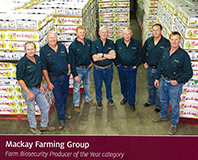Read the latest information on
Foot-and-mouth disease
 Our second profile of the Farm Biosecurity Producer of the Year Award winners is of the Mackay Farming Group of Tully, Far North Queensland.
Our second profile of the Farm Biosecurity Producer of the Year Award winners is of the Mackay Farming Group of Tully, Far North Queensland.
Bolinda Estate is owned by the Mackay Farming Group and managed by cousins Stephen and Gavin Mackay. Although known for growing bananas, they’ve diversified the business over the years to produce cattle, sugarcane and papayas too.
They are no strangers to adversity, having been wiped out by cyclone Yasi in 2011, causing a nationwide banana drought for months afterwards.
The farm location at the top of the river catchment, with no farms above it, gives it a natural advantage to reduce pest and disease threats.
Initially, the main biosecurity threat to the bananas was from nematodes. But in March 2015 the banana industry in Far North Queensland came under serious threat from Panama disease TR4.
TR4 is an ineradicable soil borne fungal disease, capable of infecting and killing all commercial banana varieties grown in Australia. It can spread in soil, water and infected plant material.
With its history of biosecurity practices Bolinda Estate was well positioned to deal with this threat.
Even with a generic biosecurity plan already in place, they found that there were ways in which to tighten biosecurity further. Some of the main improvements were:
Biosecurity is a ‘best bet’ approach to reducing the likelihood of pest and disease incursions through controllable pathways. But there is never a guarantee that even the highest levels of biosecurity will ensure a farming business remains pest and disease free.
Farm staff – who knew what to look for – were the first to spot some unusual symptoms on plants growing on Weary Pocket, a smaller 137ha farm. Samples were submitted for testing and on 12 July 2017 Bolinda Estate was placed under quarantine following a positive test result for TR4.
The Biosecurity Queensland Quarantine Notice applied to the entire property and meant that there could be no movement of soil or plant material from or between farms.
For most producers this would have been a major disruption to the business, and may have even been enough to make them give up.
But due to the extensive biosecurity protocols already in place, Bolinda Estate’s packing shed only stopped packing for two hours following the Quarantine Notice being issued.
How did that happen?
The banana fruit itself is safe and can continue to be harvested, packed and sent off farm, albeit under very strict quarantine measures.
Below is a list of activities and actions taken by management that made this possible:
This business has shown that, with sound biosecurity practices in place, it is possible to continue trading under strict quarantine conditions, with minimal impact on the business. Bolinda Estate demonstrated it had the systems, procedures, documentation and skills required to continue trading.
Many in the banana industry doubted whether a banana farm could continue to trade in the presence of TR4. It was believed practices to prevent the movement of soil and plant material would be too onerous. It wasn’t easy, but it is a credit to Stephen, Gavin, their staff and the larger Mackay Farming Group that Bolinda Estate has continued to operate under quarantine.
Because the Mackays treated sections of their property as separate production areas, and were already implementing biosecurity measures, keeping records and documenting processes, they were able to show that there was no risk to other banana growers of spreading the disease.
Whether other producers could achieve the same result depends on a number of factors, such as the crop being grown, the pest or disease and how it can spread, the processes already in place to comply with certification procedures for market access, the records available for quarantine officers to check, and the willingness to meet the requirements.
It’s not that unusual for properties to need to trade while under quarantine notices. If it does ever happen to you, the more prepared you are the easier and sooner you should be able to get back on track.